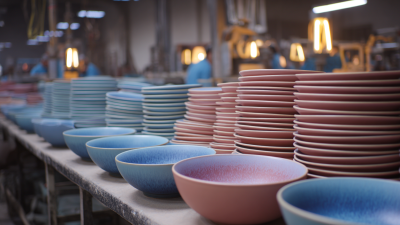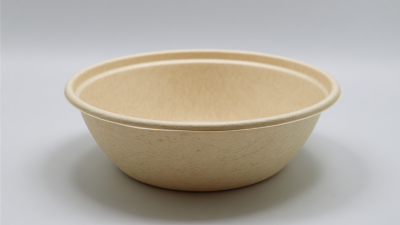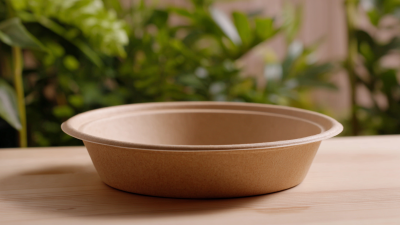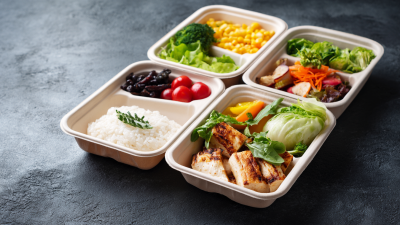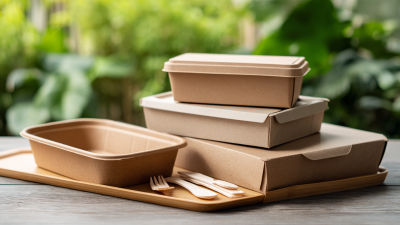In an era where sustainability is at the forefront of consumer preferences, businesses are constantly seeking innovative solutions to minimize their environmental impact. One such solution that stands out is Compostable Crockery. As the demand for eco-friendly alternatives increases, more enterprises are recognizing the significant benefits of transitioning from traditional disposable items to compostable options. Not only does Compostable Crockery drastically reduce plastic waste, but it also enhances a brand's reputation as a responsible and forward-thinking entity.

By incorporating sustainable practices into their operations, businesses can appeal to eco-conscious customers while contributing to a healthier planet. In this blog, we will explore the five compelling reasons why Compostable Crockery is the best sustainable choice for your business, highlighting its environmental advantages, cost-effectiveness, and broader impact on society.
Choosing compostable crockery for your business offers a variety of benefits that can significantly enhance your sustainability efforts. Firstly, these products are made from renewable resources, reducing reliance on fossil fuels and minimizing environmental impact. Unlike traditional plastic dishes, compostable options break down naturally after use, offering a seamless way to decrease landfill waste. By opting for compostable crockery, businesses can cultivate a more environmentally friendly image, appealing to eco-conscious customers and differentiating themselves from competitors.
Additionally, compostable crockery ensures food safety and quality. Many options are designed to withstand hot foods and liquids, eliminating the risk of leaching harmful chemicals. This not only enhances customer satisfaction but also contributes to a healthier dining experience. Furthermore, by incorporating compostable products into your operations, you are actively participating in a circular economy, which encourages resource efficiency and promotes sustainability within your community. Transitioning to compostable crockery isn't just a trend; it's a strategic move towards a more responsible business model that benefits both the environment and your brand's reputation.
The shift towards sustainable business practices is gaining momentum, and one significant way to embrace this change is by using compostable crockery. Unlike traditional single-use plastics, compostable materials break down naturally, returning nutrients to the soil and reducing landfill waste. This process significantly diminishes the carbon footprint associated with waste management, making it an environmentally friendly alternative.
Moreover, the environmental impact of using compostable materials extends beyond waste reduction. They contribute to a circular economy by promoting organic recycling. As they decompose, compostable crockery enriches the soil, supports plant growth, and enhances biodiversity. This not only helps combat climate change but also fosters healthier ecosystems. Businesses that choose compostable options demonstrate their commitment to sustainability, appealing to a growing number of eco-conscious consumers who prioritize responsible practices in their purchasing decisions.
When considering sustainable options for your business, compostable crockery stands out not only for its environmental benefits but also for its cost-effectiveness. While the initial investment may seem higher than traditional disposable options, the long-term savings are undeniable. Compostable crockery often reduces waste management costs, as businesses can decrease their reliance on expensive landfill services. Additionally, various municipalities now offer composting programs that may waive fees for businesses that participate, leading to further financial incentives.
Moreover, customers increasingly gravitate towards eco-friendly brands. By utilizing compostable crockery, businesses can enhance their market appeal, attracting environmentally-conscious consumers. This shift can result in increased sales, as customers are willing to pay a premium for sustainable practices. In the long run, the positive brand image fostered through the use of compostable products can drive customer loyalty and repeat business, ultimately translating into higher profits. Investing in compostable options is not just a responsible choice; it's a strategic one that aligns with consumer values and can yield substantial financial rewards over time.
| Dimension | Traditional Crockery (Cost/Year) | Compostable Crockery (Cost/Year) | Savings (Cost/Year) |
|---|---|---|---|
| Average Annual Usage (Units) | 10,000 | 10,000 | - |
| Cost per Unit | $0.50 | $0.70 | - |
| Total Costs | $5,000 | $7,000 | -$2,000 |
| Waste Disposal Costs (Annual) | $1,500 | $500 | $1,000 |
| Total Annual Cost | $6,500 | $7,500 | -$1,000 |
| Environmental Benefits | Limited | High | N/A |
In today's competitive market, consumer preferences are shifting dramatically towards sustainability, and businesses are taking notice. One of the most compelling trends is the rising demand for compostable crockery. Customers are increasingly choosing products that align with their values, and compostable options are seen as a responsible choice that reduces environmental impact. This preference reflects a broader societal shift where people are not just seeking convenience but also products that contribute positively to the planet.

Moreover, the hospitality industry is particularly benefiting from this shift. As the global market for salon services and kitchen cabinetry continues to grow, businesses are under pressure to adopt practices that appeal to eco-conscious consumers. Offering compostable crockery not only meets this demand but also enhances a brand's reputation. By adopting sustainable practices, businesses can foster deeper connections with customers who prioritize environmental responsibility in their purchasing decisions, ultimately driving loyalty and creating a competitive edge in a crowded marketplace.
Implementing compostable crockery in your business operations can significantly enhance your sustainability efforts while appealing to environmentally conscious consumers. Start with educating your staff about the benefits and proper disposal of compostable products. Conduct training sessions to ensure that everyone understands how these items fit into your overall waste management strategy and can effectively communicate this to customers.
Next, evaluate your current supply chain and establish partnerships with suppliers who specialize in eco-friendly products. This may require some initial research to find reliable sources of compostable crockery, but the long-term benefits for your business and the environment will be worthwhile. Additionally, consider integrating clear signage within your establishment to guide customers on how to dispose of their compostable items correctly, ensuring maximum effectiveness of your composting efforts. By taking these proactive steps, you can seamlessly transition to a more sustainable operation, showcasing your commitment to reduction in waste and promoting a greener future.

